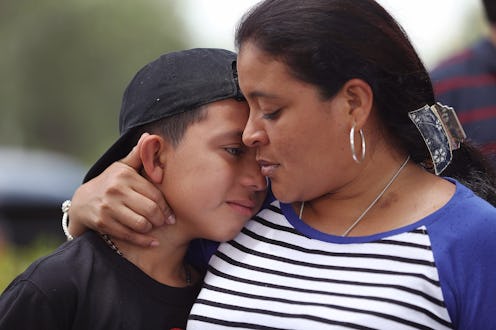News
Trump Is Telling 200,000 El Salvador Immigrants To Get Out. Here's How To Help Them

In an announcement made by the Department of Homeland Security on Monday, the White House under Donald Trump ended protected status for 200,000 El Salvadorans. For activists seeking a fair immigration system, the announcement sounds unfair and intimidating. There are ways you can help, however.
Under this decision, the temporary residency for Salvadorans will end in the next 18 months. To justify their move, the Department of Homeland Security said that the Temporary Protected Status no longer applied to the citizens of the country as "the original conditions caused by the 2001 earthquakes no longer exist."
Almost 16 years ago, two earthquakes rocked El Salvador, leading to the deaths of over 1,000 people. In addition to the death toll, officials reported that 1.3 million people were displaced from their homes. In 2001, the local government of El Salvador complained that aid, in the form of clothes, infrastructure financing, and other modes of help, wasn't reaching the devastated country.
For many who lost their precious homes and belongings in the 2001 earthquakes, the destruction still affects their lives. It's no surprise then that Monday's announcement left observers rattled and shocked. One user of Salvadoran heritage tweeted:
I am losing my #TPS status. I don't even know how to process this. How do I get through today? I am panting, gasping for air.
If you feel strongly that immigrants should have a fair chance at living in the United States, there are ways you can make yourself heard.
Get In Touch With Your Elected Officials
A call to an elected official can go a long way. Ask to speak with the legislative aide on your elected official's team and tell them why — in simple and brief terms — you're calling. A legislative aide is someone trained in law and able to address your concerns. Make your point and thank them for their time. Pick up your phone and get calling.
Raise Awareness
Often, people support dangerous stereotypes against others without really checking their assumptions. If you know someone who thinks people of El Salvador pose an existential threat to the United States, share these facts with them about who Salvadorans are, how they got here, and how paranoia helps no one.
You can also tell such a person that sending Salvadoran immigrants "back" to the country won't help them. As activist Marselha Gonçalves Margerin told NPR, "If forced to return to El Salvador, mothers, fathers, and children could face extortion, kidnapping, coerced service to gangs, and sexual violence."
Support United We Dream
Organizations like United We Dream help immigrants gain better access to residency and equip them with resources on their rights, regardless of their legal status.
You can support Salvadorans affiliated with the network by donating to and volunteering with the organization.
Join A Protest
Get out there. As the announcement reaches everyone in the country, there may be demonstrations and protests from different organizations and their various local chapters in different states.
Donate To The Young Center for Immigrant Children's Rights And The National Immigration Law Center
Perhaps the most vulnerable group in the Salvadoran demographic are children. You can support young immigrants by donating to the The Young Center for Immigrant Children's Rights. The organization helps younger people of immigrant backgrounds with legal help, resources, and advocacy. You can also donate to the the National Immigration Law Center which offers legal assistance through the United States.
While this list is not an exhaustive resource, it will get you started on helping immigrants in need of guidance and protection. As the fates of some 200,000 Salvadorans remain uncertain, following even one of these tips could go a long way.